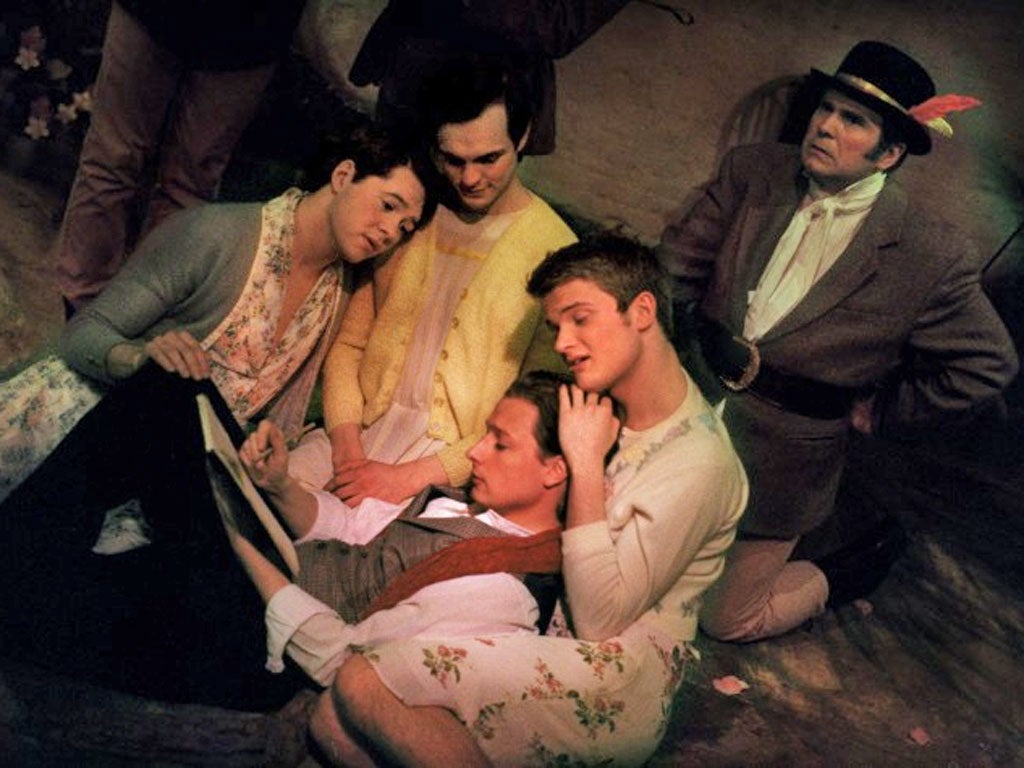Patience, Union Theatre, Southwark, London Kirchschlager/Bostridge, Wigmore Hall, London London Philharmonic/ Jurowski, Royal Festival Hall, London
Sasha Regan's all-male operetta tinkers lightly with gender, love and misery, and it's enough to keep you smiling for two solid hours

Weeping, crying, moaning, sighing ... music loves a good blub. The 20 lovesick maidens – whose unrequited love for the sham poet, Bunthorne, causes them such delectable pain – are enmeshed in misery in the opening scene of Gilbert and Sullivan's Patience. Demure in their graceful tea-gowns and embellished cardigans, they are caught in a cat's cradle of their own making as both their knitting and their composure unravel in the throes of their desire.
Sasha Regan's third all-male G&S operetta, at the Union Theatre, Southwark, tinkers lightly with gender, more subtly than the delightfully camp Pirates of Penzance or the knowing Iolanthe that have gone before. In this nimble satire on the Aesthetic movement, with its sideways whack at G&S contemporary Oscar Wilde, the simpering spinsters become androgynous wraiths who would slip unnoticed into London Fashion Week. Regan's ingenuity in cross-casting roles strips out the drippier aspects of WS Gilbert's female characters and reignites much of his wicked wit.
Her Bunthorne, meanwhile, amiably played by Dominic Brewer, is an easier sort of fellow than the pouting pansy of traditional productions. Thus, when the inevitable happy ending snaps every singleton into wedlock, the older Lady Jane, dessicated and disappointed, gets a better deal than usual when coupled to the pretty author. In Stiofan O'Doherty as Archibald, Regan has found an attractive rival poet and a genuine catch for the sensible, unimpressionable milkmaid Patience (Edward Charles Bernstone).
What all this means, musically, is a winning mix of simple airs, full-throttle choruses that tap into Sullivan's comfortable grand-opera style, and fashionable economy: the lovelorn ladies, once off-stage, drop an octave and beef up the volume for the onstage buffoons of the Dragoons, their own indignant, jilted suitors. At the piano, one-man austerity orchestra Richard Bates plays along in a pretty print frock and with a twinkle in his eye. And yet it will be good to hear this company with even a small band one day.
Nonetheless, this Patience is a virtue, with notable singing from James Lacey as Lady Angela and Matthew James Willis as the Duke of Dunstable, and, on a handkerchief stage, entertaining choreography and movement by Drew McOnie. Better even than a good blub is to find yourself smiling contentedly for two solid hours.
In "Figures from the Antique", at the Wigmore Hall, it was misery all the way for the classical characters whose stories inspired four vocal items in a programme of ingenuity and breathtaking musicianship. Defiled Lucrezia, incendiary Nero, poisoned Socrates and incestuous Phaedra came to their various sticky ends with the help of Handel, Scarlatti, Satie and Britten. Giving voice to their suffering were Angelika Kirchschlager and Ian Bostridge, with an recession-defying pair of instrumental ensembles – The English Concert under Laurence Cummings and Aurora Orchestra under Nicholas Collon.
Kirchschlager's vast palette of colour contrasts intriguingly with Bostridge's pastels of understatement – the two did not sing together, which is rather like having your gin and tonic in separate glasses. But in place of that alchemy of combined voices, here was the full range of loss, from the fury of dishonoured Lucrezia in Handel's O numi eterni, and Britten's broken Phaedra, both Kirchschlager, to Bostridge's lightly unhinged emperor in Scarlatti's Il Nerone and the plangent, evangelistic account of the philosopher's death in prison in Satie's La Mort de Socrate. With stellar playing by both bands, this was a dazzling cluster of expertly set gems, if more arresting than affecting. Both Cummings and Bostridge joined the audience for Kirchschlager's powerful Britten finale, Phaedra's struggle to her toxic death, a sure sign that something remarkable was about to unfold.
Psalm 23, "The Lord is my shepherd ...", often gulped through sobs at funerals, got a more muscular treatment when set by Alexander Zemlinsky in 1910, this vision of fearlessness, comfort and bounty, bold and bright, opening the second half of the London Philharmonic's Wednesday-night concert, broadcast live from the Royal Festival Hall on Radio 3. The programme that began with Mozart's theatrical nugget Symphony No 32 and Brahms's Violin Concerto, soloist Joshua Bell oddly detached and playing his own, angular cadenza, closed with a giant – Szymanowski's Symphony No 3, The Song of the Night.
The Polish composer, an expert in Islamic culture, chose the poetry of the Persian mystic Jalal'ad-Din Rumi for this mammoth work. Drawn to the homoerotic subtext of this paeon to both earthly and divine love, he scored the work for tenor (here Jeremy Ovenden), chorus and orchestra, but above all it was the Philharmonic Choir on spectacular form that breathed life into the sensual and ecstatic text. With tumescent, fluorescent climaxes from the organ and orchestra under an impassioned Vladimir Jurowski, this sexy love song was positively X-rated. You can catch it on Listen Again until Tuesday. But you might wait until Lady Jane is out of the room.
'Patience' (020-7261 9876 ), to 10 Mar
Next Week
Anna Picard hears the siren call of the Royal Opera's new Rusalka
Classical Choice
The London premiere of John Adams's The Death of Klinghoffer at ENO, examines the killing of a tourist in the 1985 hijacking of the Achille Lauro cruise liner (to 9 Mar). In Cambridge, The Choir of King's College, under David Trendell, sings Bach's B-Minor Mass in the chapel, with the Royal Academy of Music Baroque Ensemble (Tue).
Subscribe to Independent Premium to bookmark this article
Want to bookmark your favourite articles and stories to read or reference later? Start your Independent Premium subscription today.

Join our commenting forum
Join thought-provoking conversations, follow other Independent readers and see their replies